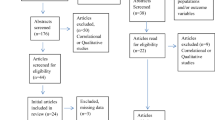In this issue of Academic Psychiatry, we have given special attention to methodological issues relevant to educational and mental health research. In the first paper that follows, Ruth Levine and colleagues describe the importance of anonymity in survey studies that inquire about the personal mental health issues of medical students. This work is innovative and empirically derived, making it an unusually valuable contribution to the psychiatric education literature. In his companion commentary, Michael Myers of the University of British Columbia reminds us of the genuine humanity that we each bring to the practice of medicine. Together this paper and commentary underscore the imperative to pursue research on important but neglected medical student health care issues. They further demonstrate the need to do such work with sensitivity and with an awareness of intersecting ethical and scientific issues. The second paper, by Judith Meinert and colleagues, focuses on the recruitment of African-American women as subjects in mental health research. Although it is a nontraditional topic for our journal, the reviewers enthusiastically endorsed the importance of this paper for our readers who wish to engage in educational research efforts with students and residents of culturally and ethnically distinct backgrounds. The companion commentary by Lauren Bonner of the University of Washington gives emphasis to shared history and emerging collaborative opportunities in human research. Attention by academic psychiatrists to the considerations presented in this set of manuscripts may help ensure that educational research in our field is respectful, attuned, and methodologically rigorous. —Ed.
Abstract
Objective: To evaluate students’ attitudes and concerns regarding potential repercussions of completing the Beck Depression Inventory (BDI). Methods: A survey based on focus group data was developed and distributed. Results: One hundred and ninety-one of 400 surveys (48%) were returned. Of 160 students who remembered completing the BDI, 31 (19%) admitted to concerns about the research, and nearly 10% admitted to recording dishonest answers. Conclusions: These findings emphasize the importance of conducting anonymous assessments of medical students, particularly when assessing sensitive psychological states.
Similar content being viewed by others
References
Levine RE, Bryant SG: The depressed physician: a different kind of impairment. Hosp Physician 2000; 36: 67–73
Lindeman S, Laara E, Hakko H, et al: A systematic review on gender-specific suicide mortality in medical doctors. Br J Psychiatry 1997; 168: 274–279
Clark DC, Zedlow PB: Vicissitudes of depressed mood during four years of medical school. JAMA 1988; 260: 2521–2528
Barrett J, Hurst MW, DiScala C, et al: Prevalence of depression over a 12-month period in a nonpatient population. Arch Gen Psychiatry 1978; 35: 741–744
Zoccolillo M, Murphy GE, Wetzel RD: Depression among medical students. J Affect Disord 1986; 11: 91–96
Camp DL, Hollingsworth ME, Zaccaro J, et al: Does a problem-based learning curriculum affect depression in medical students? Acad Med 1994; 69(10, suppl): S25–S27
Wolf TM, Scurria PL, Webster M: A four-year study of anxiety, depression, loneliness, social support and perceived mistreatment in medical students. J Health Psychol 1998; 3: 125–136
Lieberman SA, Stroup-Benham CA, Peel JL, et al: Medical student perception of the academic environment: a prospective comparison of traditional and problem-based curricula. Acad Med 1991; 72(10, suppl): S13–S15
Roberts LW, Geppert C, Connor R, et al: An invitation for medical educators to focus on ethical and policy issues in research and scholarly practice. Acad Med 2001; 76: 876–885
Boisaubin E, Levine R: Identifying and assisting the impaired physician. Am J Med Sci 2001; 322: 31–36
Dickstein LJ: Medical students and residents: issues and needs, in The Handbook of Physician Health. Edited by Goldman LS, Myers M, Dickstein LJ. Chicago, American Medical Association, 2000, pp 161–179
Bittker TE: Reaching out to the depressed physician. JAMA 1976; 236: 1713–1716
Martin E: Surveys as social indicators: problems in monitoring trends, in Handbook of Survey Research. Edited by Rossi PH, Wright JD, Anderson AB. San Diego, CA, Academic Press, 1985, pp 677–736
Helmers KF, Danoff D, Steinert Y, et al: Stress and depressed mood in medical students, law students, and graduate students at McGill University. Acad Med 1997; 72: 708–714
Sierles FS, Kushner BD, Krause PM: A controlled experiment with a medical student honor system. J Med Educ 1988; 63: 705–712
Bradburn NM: Response effects, in Handbook of Survey Research. Edited by Rossi PH, Wright JD, Anderson AB. San Diego, CA, Academic Press, 1985, pp 289–318
Author information
Authors and Affiliations
Corresponding author
Additional information
The authors thank Anne Frye, Ph.D., Steven Lieberman, M.D., and James Hokanson, Ph.D., for their assistance with this research and Paula Levine for her assistance in preparation of the manuscript. This research was presented during a poster session at the 27th annual meeting of the Association of Directors of Medical Student Education in Psychiatry, Whistler, BC, June 21–23, 2001.
Rights and permissions
About this article
Cite this article
Levine, R.E., Breitkopf, C.R., Sierles, F.S. et al. Complications Associated With Surveying Medical Student Depression. Acad Psychiatry 27, 12–18 (2003). https://doi.org/10.1176/appi.ap.27.1.12
Published:
Issue Date:
DOI: https://doi.org/10.1176/appi.ap.27.1.12



